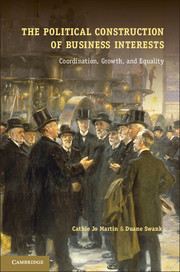Book contents
- Frontmatter
- Contents
- Figures
- Tables
- Acknowledgments
- Introduction
- 1 Collective Political Engagement and the Welfare State
- 2 The Political Origins of Coordinated Capitalism
- 3 Party Conflict and the Origins of Danish Labor Market Coordination
- 4 British Experiments in National Employers’ Organization
- 5 Sectional Parties and Divided Business in the United States
- 6 The Origins of Sector Coordination in Germany
- 7 Twenty-First Century Breakdown? Challenges to Coordination in the Postindustrial Age
- 8 Institutional Sources of Employers’ Preferences for Social Policy
- 9 Employers, Coordination, and Active Labor Market Policy in Postindustrial Denmark
- 10 Employers and Active Labor Market Policy in Postindustrial Britain
- 11 The Failure of Coordination and the Rise of Dualism in Germany
- 12 The Political Foundations of Redistribution and Equality
- Conclusion Social Solidarity after the Crisis of Finance Capitalism
- Bibliography
- Index
2 - The Political Origins of Coordinated Capitalism
Published online by Cambridge University Press: 05 June 2012
- Frontmatter
- Contents
- Figures
- Tables
- Acknowledgments
- Introduction
- 1 Collective Political Engagement and the Welfare State
- 2 The Political Origins of Coordinated Capitalism
- 3 Party Conflict and the Origins of Danish Labor Market Coordination
- 4 British Experiments in National Employers’ Organization
- 5 Sectional Parties and Divided Business in the United States
- 6 The Origins of Sector Coordination in Germany
- 7 Twenty-First Century Breakdown? Challenges to Coordination in the Postindustrial Age
- 8 Institutional Sources of Employers’ Preferences for Social Policy
- 9 Employers, Coordination, and Active Labor Market Policy in Postindustrial Denmark
- 10 Employers and Active Labor Market Policy in Postindustrial Britain
- 11 The Failure of Coordination and the Rise of Dualism in Germany
- 12 The Political Foundations of Redistribution and Equality
- Conclusion Social Solidarity after the Crisis of Finance Capitalism
- Bibliography
- Index
Summary
Introduction
At the dawn of the twenty-first century, varieties of capitalist democracies seem worlds apart. Despite globalization and industrial restructuring, the Scandinavian countries have largely retained “macrocorporatism.” In Germany and other continental European countries, economy-wide negotiations are on the decline, although economic sector-based coordination is resilient. Finally, an aversion to cooperation appears bred in the bone in the Anglo-liberal lands of the United States and Great Britain: “Pluralist” associations organize employers and workers, and the representation of business interests remains a highly individualistic affair.
Whereas it is tempting to conclude that these patterns of cooperative engagement versus laissez-faire individualism are indelibly imprinted on national psyches, a century ago they were much less distinct. Employers and their political allies across the west shared many beliefs about developmental capitalism and national movements struggled in parallel fashion to develop highly coordinated peak business associations to push these industrial policy agendas. The late nineteenth century was a period of enormous political transformation, as capitalist development and the first wave of globalization created pressures for national industrial policies. Even in the United States, communities were noteworthy for their Tocquevillian patterns of cooperation, and the movement for national business organization sought to emulate these community efforts in nonmarket coordination. Yet in the process of nationalizing political engagement, the “virtuous circles” of coordination failed to thrive beyond the community level in the Anglo countries, even while they ultimately took hold in continental Europe.
- Type
- Chapter
- Information
- The Political Construction of Business InterestsCoordination, Growth, and Equality, pp. 28 - 49Publisher: Cambridge University PressPrint publication year: 2012

